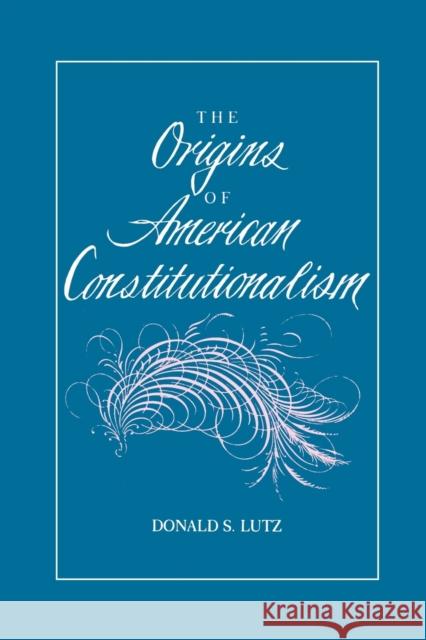The Origins of American Constitutionalism » książka
The Origins of American Constitutionalism
ISBN-13: 9780807115060 / Angielski / Miękka / 1988 / 192 str.
In The Origins of American Constitutionalism, Donald S. Lutz challenges the prevailing notion that the United States Constitution was either essentially inherited from the British or simply invented by the Federalists in the summer of 1787. His political theory of constitutionalism acknowledges the contributions of the British and the Federalists. Lutz also asserts, however, that the U.S. Constitution derives in form and content from a tradition of American colonial characters and documents of political foundation that began a century and a half prior to 1787.
Lutz builds his argument around a close textual analysis of such documents as the Mayflower Compact, the Fundamental Orders of Connecticut, the Rode Island Charter of 1663, the first state constitutions, the Declaration of Independence, and the Articles of Confederation. He shows that American Constitutionalism developed to a considerable degree from radical Protestant interpretations of the Judeo-Christian tradition that were first secularized into political compacts and then incorporated into constitutions and bills of rights. Over time, appropriations that enriched this tradition included aspects of English common law and English Whig theory. Lutz also looks at the influence of Montesquieu, Locke, Blackstone, and Hume. In addition, he details the importance of Americans' experiences and history to the political theory that produced the Constitution. By placing the Constitution within this broader constitutional system, Lutz demonstrates that the document is the culmination of a long process and must be understood within this context. His argument also offers a fresh view of current controversies over the Framers' intentions, the place of religion in American politics, and citizens' continuing role in the development of the constitutional tradition.
In The Origins of American Constitutionalism, Donald S. Lutz challenges the prevailing notion that the United States Constitution was either essentially inherited from the British or simply invented by the Federalists in the summer of 1787. His political theory of constitutionalism acknowledges the contributions of the British and the Federalists. Lutz also asserts, however, that the U.S. Constitution derives in form and content from a tradition of American colonial charters and documents of political foundation that began a century and a half prior to 1787.Lutz builds his argument around a close textual analysis of such documents as the Mayflower Compact, the Fundamental Orders of Connecticut, the Rhode Island Charter of 1663, the first state constitutions, the Declaration of Independence, and the Articles of Confederation. He shows that American constitutionalism developed to a considerable degree from radical Protestant interpretations of the Judeo-Christian tradition that were first secularized into political compacts and then incorporated into constitutions and bills of rights. Over time, appropriations that enriched this tradition included aspects of English common law and English Whig theory. Lutz also looks at the influence of Montesquieu, Locke, Blackstone, and Hume. In addition, he details the importance of Americans experiences and history to the political theory that produced the Constitution. By placing the Constitution within this broader constitutional system, Lutz demonstrates that the document is the culmination of a long process and must be understood within this context. His argument also offers a fresh view of current controversies over the Framers intentions, the place of religion in American politics, and citizens continuing role in the development of the constitutional tradition.











